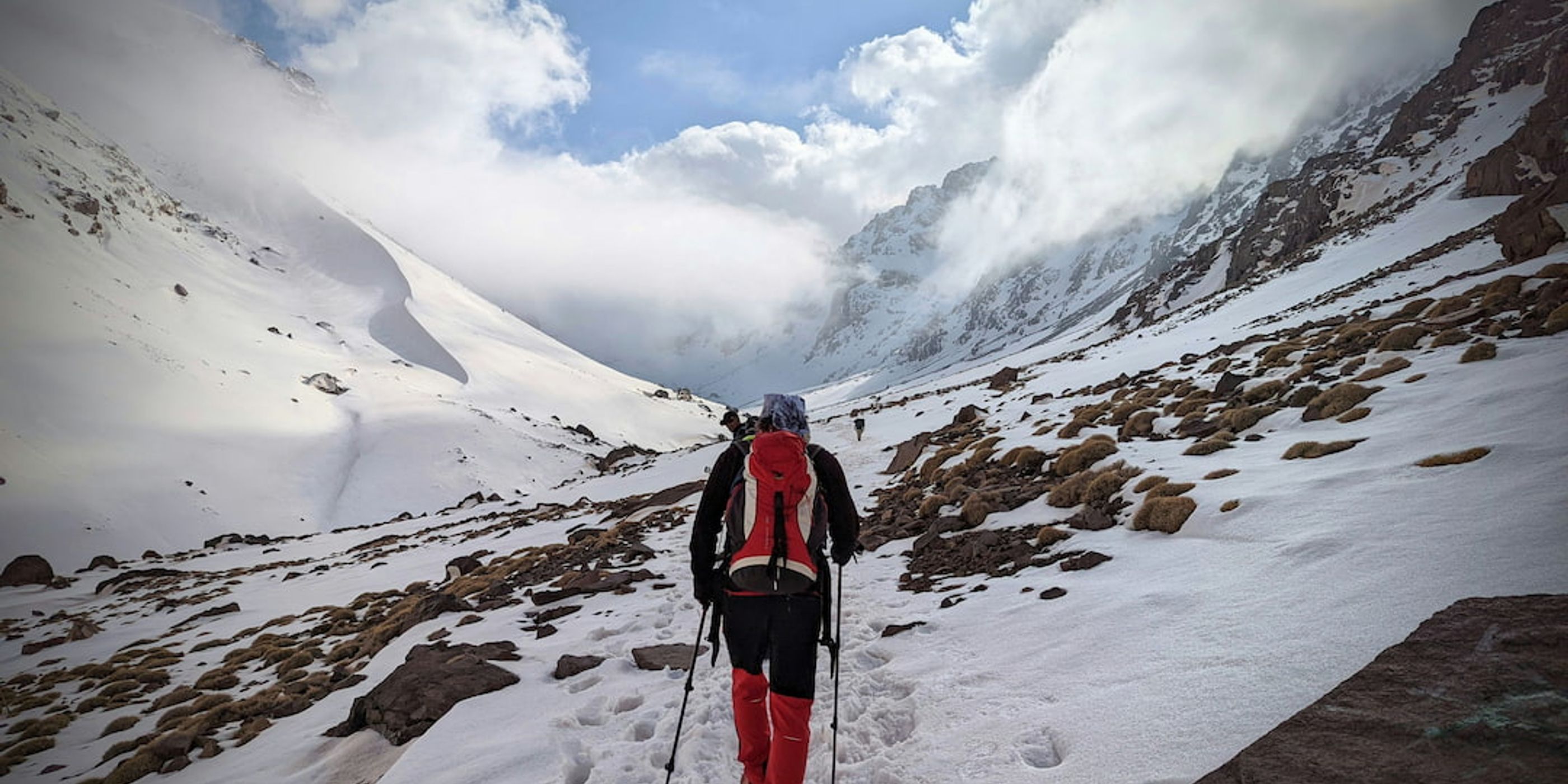
Toubkal in Winter: Difficulty, Tips, Tricks & What to Expect
Mount Toubkal is not only the highest peak in North Africa, it's surrounded by the stunning High Atlas Mountains.
Whether you're a seasoned alpinist or a novice walker, read on for everything you need to know for your Mount Toubkal Winter Trek
Mount Toubkal difficulty: How hard is it?
Quick answer: It’s a non‑technical winter trek but a solid challenge. Expect 6–8 hour days on rough ground, steep snowy sections, and thin air at 4,167 m. You’ll use crampons and carry an ice axe (training provided), and a licensed guide is mandatory. Good hill fitness required.
Toubkal in winter isn't as extreme as some mountain environments, but it still demands respect.
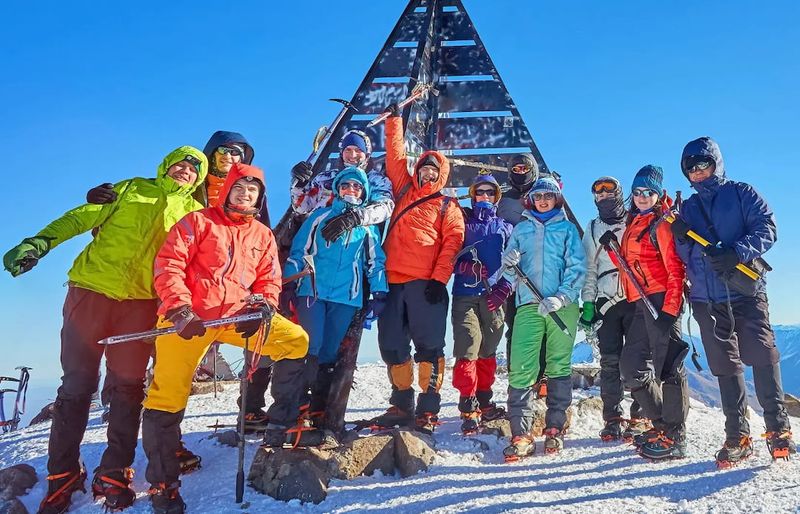
You won't need technical climbing skills but Mount Toubkal is a challenge, and you'll need a good level of physical fitness and to be equipped for winter walking conditions.
A winter climb is an adventure alright - you against Morocco's snowy High Atlas mountains.
Let’s get into what you'll need to know to make the dream a reality.
Fancy tackling Mount Toubkal in winter?
If you book to climb Mount Toubkal with Call to Adventure, you can hire crampons and an ice axe from the guide so you don’t have to bring them from home.
The guide will also give you any training needed on how to use them so beginners are very welcome!
The Altitude Challenge in the High Atlas Mountains: Altitude Sickness
One of the biggest fears people have is altitude sickness.
At 4,167 meters Mount Toubkal is a serious mountain and sure, there’s less oxygen.
Severe cases of mountain sickness can lead to High Altitude Pulmonary Edema (HAPE) or High Altitude Cerebral Edema (HACE), both of which can be deadly.
Altitude symptoms on the standard Toubkal itinerary are uncommon but possible. Expect to be more breathless than usual; mild headache or poor sleep can happen. If symptoms worsen or don’t improve with rest, descend.
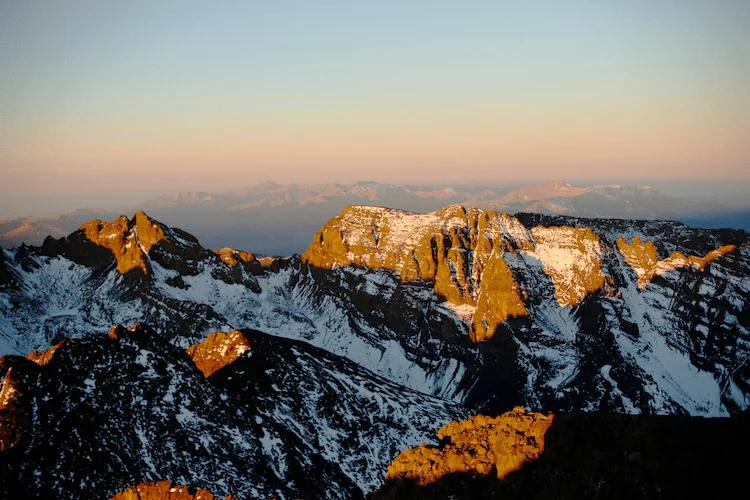
If you're still concerned, following these tips will help to nip any symptoms in the bud:
- Acclimatisation: If you can, spend a night in Imlil (1,740 m) before trekking to the refuge (3,206 m).
- Hydration: Sip regularly; aim for pale urine (straw coloured...lovely). Avoid excessive alcohol the day before you start.
- Pace: “Slow is smooth.” Small steps, steady rhythm, and take short, regular breathers.
- Medication: Some trekkers use acetazolamide (Diamox). Not essential for Toubkal—speak to your GP if you’re considering it.
- Red flags: Severe headache, ataxia (clumsiness), repeated vomiting, confusion, or breathlessness at rest—tell your guide immediately and descend.
What it takes to climb Mount Toubkal in winter
Climbing Mount Toubkal is a massive achievement, but it'll test you both physically and mentally. Toubkal is not a technical climb but should not be taken lightly, especially when there’s deep snow and ice.
You’ll be walking for 6-8 hours on rough and rocky terrain and you’ll need crampons and an ice axe.
As with any winter mountain climb, be ready to face strong winds, rain, snow and full-on winter conditions.
Temperatures can drop as low as -10 ° (or sometimes lower) on the summit but the wind chill factor can make it feel even colder.
The climb starts with easy angled snow slopes which will help your body adjust before hitting the steeper terrain further up. As you climb, be ready for steeper sections, loose rocks and uneven trails.
You'll need to don crampons and have your ice axe at the ready when we hit the steep snowy sections.
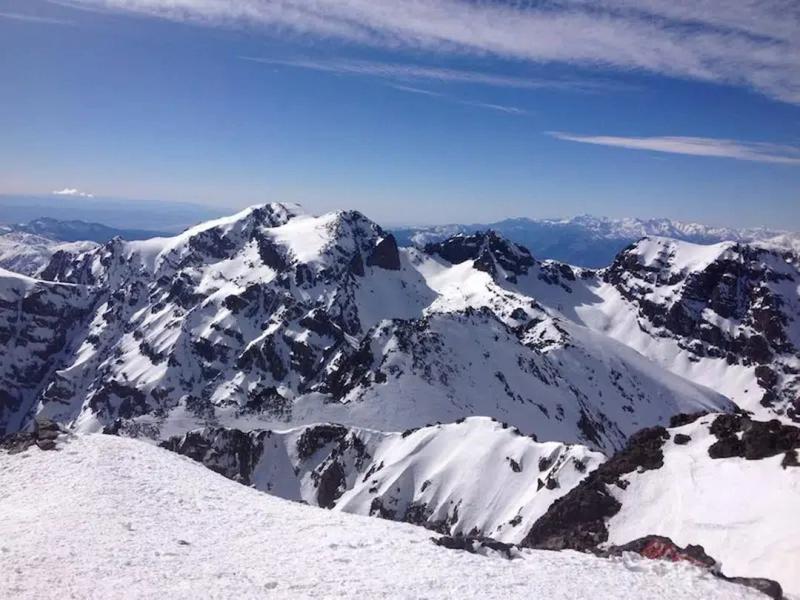
Reaching the summit and looking at the vista of the stunning snowy Atlas Mountains and a huge chunk of North Africa will be an amazing experience.
But be sure to leave something in the tank for the descent. And watch your footing.
Training:
- Cardio: Running, cycling and swimming will all help build your fitness and endurance. Aim for at least 30 minutes, 3-4 times a week.
- Strength training: Focus on exercises to strengthen your glutes and core. Squats, lunges and calf raises are good options.
- Endurance: Get out on some long walks, gradually increasing the distance. Get used to carrying a rucksack and go find some tricky terrain and some hills to negotiate. Get out in some of the gnarliest weather you can find - it will help build mental and physical endurance. Get used to keeping moving even when you want to stop! If you can fit in some winter walking, that's ideal!
- Flexibility: Stretching isn't the most popular thing out there but stretching before and after your workouts is a good idea.
- Have a chat with your doctor if you have any worries about your health - best to be safe!
The fitter you are the more you’ll enjoy the climb and the better you'll be able to cope when things get tough - both mentally and physically.
- Hill days: Build to back‑to‑back 6–8 hr hikes with 800–1,000 m ascent while carrying 8–10 kg.
- Conditioning: 3–4 cardio sessions/week (30–60 mins) plus 2 strength sessions (squats, lunges, step‑ups, core).
- Skills: If you can, do a UK winter skills day to practice walking in crampons and using an ice axe. Here's a great option for that Climb Ben Nevis Winter: Learn Winter Skills
Want the complete scoop on hiking Toubkal?
Check out your ultimate guide to Toubkal with tips from a local guide with 30 years' experience.
Time Commitment
A trek to the Atlas Mountains and a climb of Mount Toubkal can be done over 4 days.
Giving yourself 5 days to summit Mount Toubkal in winter means some contingency time in case of bad weather but we find a 4 day trip (2 days hiking) is enough.
Summit day is the toughest: typically 8–10 hours round‑trip (5–7 up, 3–4 down), depending on snow and conditions.
Tip: if you want maximum snow, the best months are between December and February.
October and November treks will probably see some snow, but the weather's still fairly dry so you might only see snow at the summit. Remember though - those lovely dry, crisp days make for awesome mountain views!
Daylight is short in mid‑winter, so expect early starts and a head torch for the approach. For reliable snow, December–February is prime; March–April often brings firm morning snow and softer afternoons.
Essential Gear:
The right gear can make or break your winter climb.
You'll ideally have some basic winter walking skills but you won't need to be a full-on mountaineer to climb Mount Toubkal in winter. Again, if you book with us you'll be taught all the skills you need on the trip so beginners are welcome
Climb Mount Toubkal
For a winter climb you'll need the following:
- Think layers - thermal base layers, fleece and down jacket.
- Crampons and an ice axe are needed - or can be hired - for icy terrain. These are included in our Mount Toubkal Winter Trek
- 4-season boots: Compatible with step-in crampons.
- Gloves and Hat: It can be bloomin' cold!
- Emergency Gear: Personal first aid kit, whistle and head torch - winter means shorter daylight hours so you may well be setting off or finishing in the dark.
- Waterproofs: Proper shell jacket and trousers (taped seams).
- Warmth: Spare gloves (liner + insulated), neck buff, goggles and sunglasses
- Poles & gaiters: Helpful for long snowy approaches.
- Extras: 30–40L pack, 1–1.5L insulated bottle/thermos, high‑SPF suncream, lip balm, snacks you like.
- Helmet: Advised when it’s icy or when there’s a risk of rock/ice fall.
Note: Microspikes aren’t a substitute for crampons on steeper, icier sections.
Use your winter walking skills to fully enjoy the snowy peaks and culture from December to April. We'll show you how to use the gear if you book with us so no experience needed.
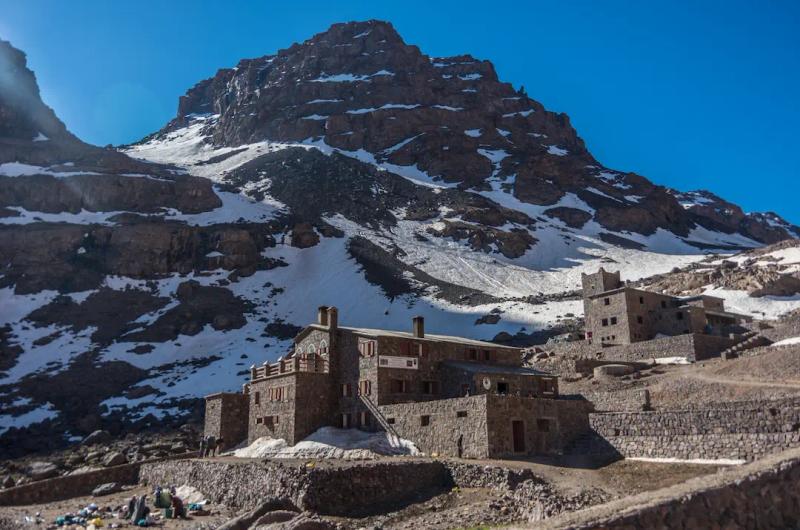
Insurance & paperwork
- Insurance: Make sure your policy covers winter trekking in Africa to 4,167 m and the use of crampons/ice axe.
- We recommend Rise and Shield
- Cash: Small cash for snacks at Imlil/Sidi Chamharouch stalls and refuge extras.
- ID: Keep your passport handy for police checkpoints on the approach roads.
Why Do I Need A Guide to Climb Mount Toubkal in Winter?
Thinking of going it without a guide?
For better or worse that's no longer an option.
Since 2018, Moroccan authorities require trekkers on Toubkal to be accompanied by a licensed guide. It’s a good thing: your guide manages safety, route‑finding, weather calls and logistics so you can focus on the climb.
There are advantages to hiring a guide though - they can actually enrich your trek and make it even more enjoyable:
- Safety: Guides are trained to deal with emergencies and know the mountains better than the back of their hand.
- Logistics: Everything from permits to meals is taken care of so just turn up and enjoy the experience.
- Cultural Insights: Local guides will give you a deeper insight into Moroccan culture and the areas you'll be walking through.
- Equipment: You'll be able to easily hire what you need for your winter climb.
Climb Mount Toubkal with us and you'll get a planned, all inclusive package so you don’t have to worry about a thing. You can just focus on the experience and make your climb of Mount Toubkal in winter one to remember.
What to Expect in Winter Conditions on Mount Toubkal
Day 1 - transfer to Imlil in the Atlas Mountains
The adventure begins! You'll be picked up from Marrakesh Airport and taken to the Berber village of Imlil at 1,740m where you’ll spend the night at the lodge.
If you arrive earlier in the day you can go and explore the city. We run 2 transfers from the airport, one at 11am and the other at 3pm. These are included in the price.
Or we can do a custom pick up at any time for a £10 extra per person.
You’ll see your first views of the High Atlas Mountains over dinner.
We’ll stay at the lodge overnight.
Day 2 - trek to Mountain Refuge de Toubkal through the Atlas Mountains
We start the trek!
We’ll head along the Mizane Valley, pass the village of Aroumd with its views of the Atlas Mountains, and climb up to the shrine of Sidi Chamharouch, a pilgrim’s haven.
You have to try the fresh orange juice from one of the stalls!
From here the trail climbs gradually, zig‑zagging to the snow line and the refuge at 3,206 m (about 5–6 hours total from Imlil).
We’ll stay at the mountain refuge (or camp if needed) overnight. Bring a warm sleeping bag!
Day 3 - Jebel Toubkal Summit
This is the biggie!
We’ll get an early start for our attempt of Jebel Toubkal, the highest mountain in the Atlas Mountains and in North Africa!
Although the initial angle is steady, the cold, altitude and occasional icy sections make it feel tougher than summer. Expect to encounter deep snow and loose rocks as we climb.
Your local team will assess weather conditions as we climb, and they'll advise when to break out the crampons and ice axe.
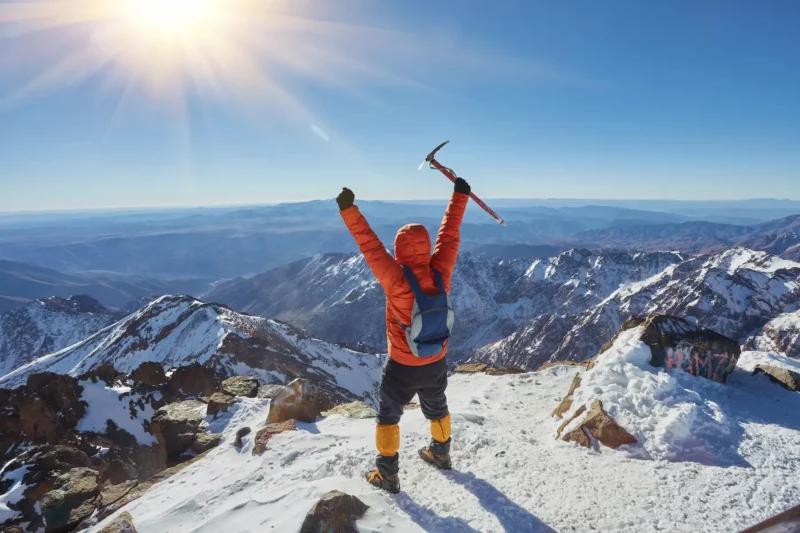
It'll test you - it's not North Africa's highest peak for nothing - but we promise those views from the top will be worth it!
Once we reach the 4,167m summit marked by the iron pillar you’ll be amazed.
If it's clear, we’ll be able to see all the way to the Marrakesh Plain and the High Atlas mountains in the North and if we’re lucky the Anti-Atlas and the Sahara Desert.
After summit selfies and taking in the views, we’ll head carefully back down the mountain and down to Imlil, passing through Sidi Chamharouch.
Back in Imlil, we transfer to Marrakesh where we’ll stay overnight in a basic but comfortable riad.
Day 4 - transfer to the airport and home
We’ll transfer you back to the airport (or the city centre if you prefer) and say goodbye after an epic adventure climbing Mount Toubkal in winter.
Many airlines flying from Marrakech still require a check‑in desk stamp. Check your airline’s current policy; carrying a printed boarding pass is often the simplest option.
So, are you ready for a winter ascent of the highest mountain in North Africa?
An ascent of Mount Toubkal in winter is more than just a trek; it’s an epic adventure that will challenge you.
However, if you're prepared to work on your fitness, take the right gear and go with an experienced local guide, a winter climb is achievable even if you've no previous experience.
Ready to climb the highest peak in North Africa and have the adventure of a lifetime?
Let's get ready to tick this one off your bucket list.
Reviewed by the licensed local Toubkal guiding team. We run this trek throughout the winter season and aim to update this page when conditions or local regulations change.
About the Author

George Beesley
Adventure Lover & Founder of Call To Adventure
George just bloody loves a bit of adventure! Imagine someone who not only hikes up mountains for breakfast but also bikes across continents. Got a case of wanderlust? This guy's been to over 50 countries and comes back with stories that'll make your grandma want to go bungee jumping.
![Climb Mount Toubkal Tips From Local Expert [30 Years Experience]](https://cdn.sanity.io/images/f5ovd1ei/production/583602f19db9ccc67b832053ccba8ca25e090833-1660x1067.webp?w=80&h=80&fit=crop&auto=format)

